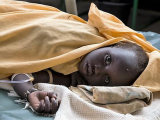Nov 29, 2010 (CIDRAP News) – Demonstrations and violence surrounding a national election in Haiti have disrupted some parts of the cholera outbreak response, as international aid groups issued pleas for more medical volunteers to staff treatment centers.
The Pan American Health Organization (PAHO), in a Nov 27 health cluster bulletin, said demonstrations in the capital Port-au-Prince prevented some health group members from attending a meeting and that similar conditions in Cap Haitien were preventing some help from reaching the area, though PAHO was able to deliver supplies on Nov 26.
The United Nations (UN) Office for the Coordination of Humanitarian Affairs (OCHA) said some humanitarian groups were suspending activities on Nov 28 during elections, though emergency response operations were continuing. Some of the prevention efforts work through the nation's schools, which were closed on Nov 26 and today due to the election, because a number of them serve as polling sites.
The UN said the number of cholera illnesses and deaths continues to rise, without much of a change in pattern. The outbreak is taking its worst toll on the northern part of the country, but health groups are preparing for major outbreaks in other parts of the country, as well.
According to the latest information on Haiti's health ministry Web site, 74,770 cases of cholera have been reported, including 32,525 hospitalizations and 1,689 deaths.
PAHO estimates that over the next 3 months Haiti will need 10 more cholera treatment centers, 39 more cholera treatment units, and 15,000 oral rehydration centers. Ramping up treatment capacity will require 350 more doctors, 2,000 nurses, 2,200 support staff, and 30,000 local community health workers who will need training.
On Nov 26 UNICEF (UN Children's Fund) issued an urgent call for Canadian French-speaking nurses to help the organization with its cholera response in Haiti. It said children are most vulnerable during the crisis and represent half of Haiti's population, where French is an official language.
"While UNICEF is bringing in additional supplies and deploying more staff in the field, lack of partners and human resources including medical staff in an overstretched health system is a serious obstacle in the effort to contain the epidemic and reduce mortality," the group said in a statement.
According to a recent health ministry survey of 37 health groups working on cholera outbreak response, key challenges are management of dead bodies, medical waste disposal, getting locations for new health centers, registration processes, and lack of trained personnel.
The World Bank announced that it is preparing a $10 million emergency grant to fund health and sanitation efforts for Haiti's cholera outbreak response, the organization said in a Nov 24 statement. The grant will also assist the efforts of nongovernmental organizations working in Haiti.
The World Bank said it will formally submit the grant to its board of directors in December, but emergency procedures allow the country to reimburse expenses that have already been incurred.
In other developments, the Dominican Republic's health ministry said yesterday that it has now received seven reports of cholera cases, Xinhua, China's state news agency, reported. Bautista Rojas Gomez, the country's health minister, said so far all of the cases are from Rio Ozama, a poor area of Santo Domingo province that lacks appropriate sanitation. He said doctors and medical teams will conduct more prevention efforts in the province's slums, which are home to many Haitians.
Just a few days before the latest cholera cases were announced, the Dominican Republic government sent military forces to close the border with Haiti, according to a Nov 27 report from Haiti Libre. Officials from Haiti said it was preparing to close its border with the Dominican Republic to prevent problems during and after its national election.
In Florida, tests are under way to determine if a man who got sick during a flight from the Dominican Republic to Miami has cholera, the Miami Herald reported on Nov 26. An American Airlines spokesman told the Herald that the man got sick on the flight on Nov 25 and was immediately hospitalized.
Dr Fermin Leguen, chief physician and director of epidemiology for Miami-Dade County, said the risk of person-to-person cholera transmission is low and that the disease is usually spread through contaminated water or food, according to the Herald report.
Kristin Nordlund, a spokeswoman from the US Centers for Disease Control and Prevention said the man is a doctor who had been treating cholera patients, though it was unclear if he had been working in Haiti, the Herald reported.
See also:
Nov 27 PAHO bulletin
Nov 25 Haiti health ministry report
Nov 26 UNICEF Canada press release
Nov 24 World Bank press release
Nov 29 Xinhua story
















